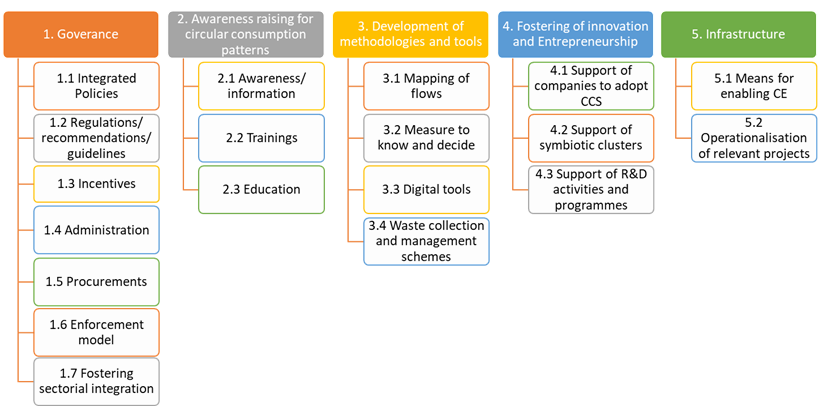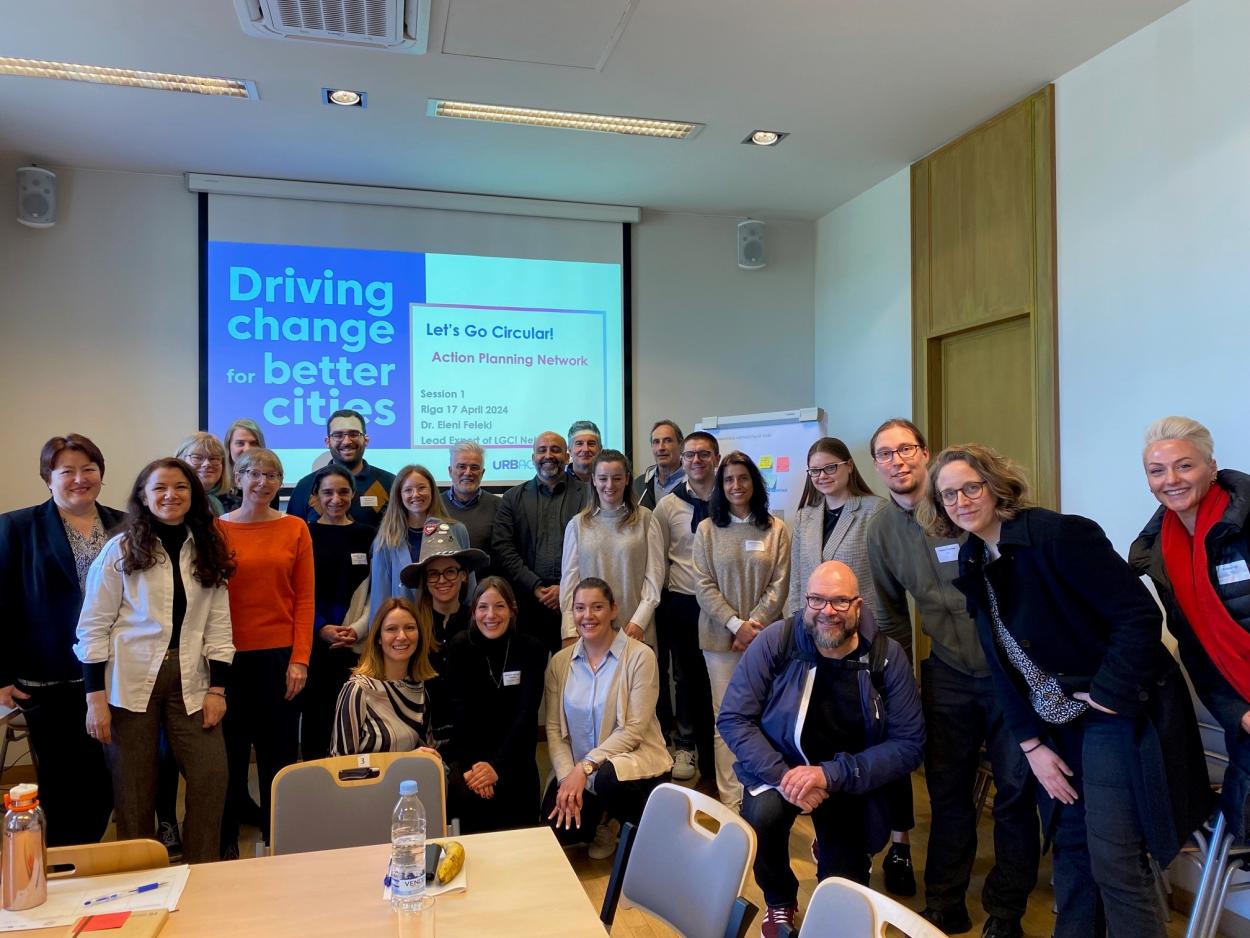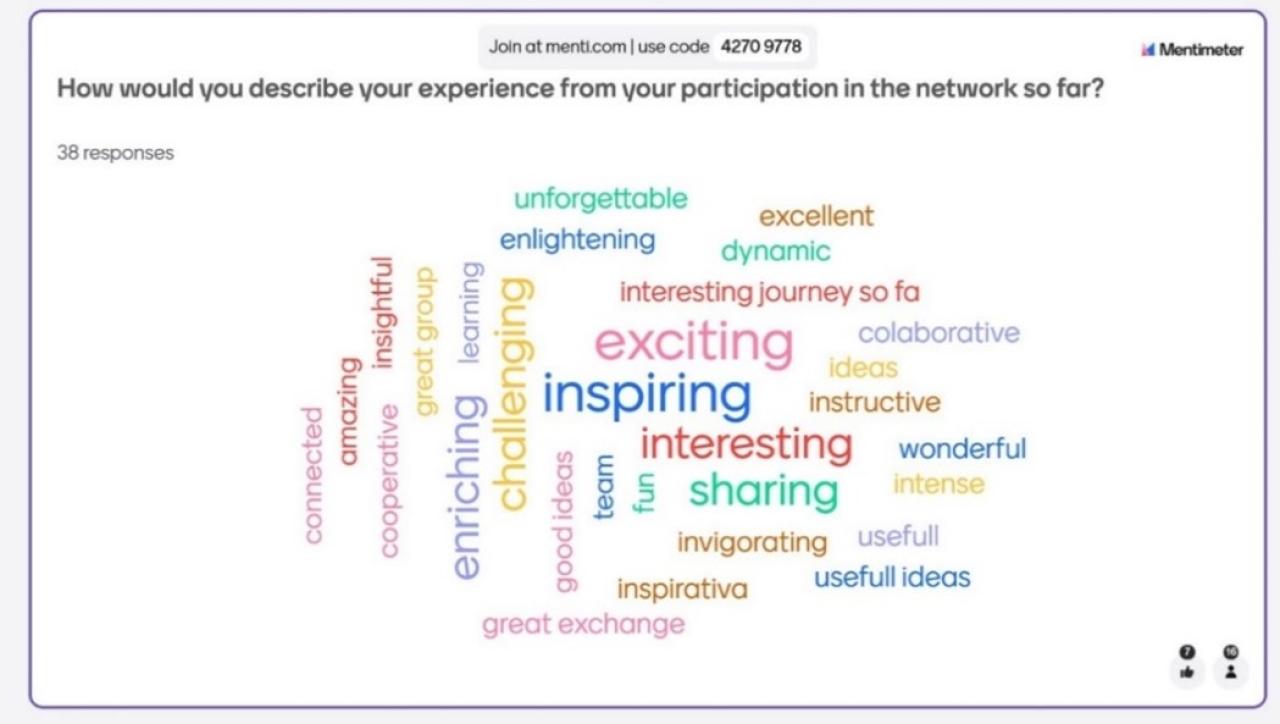Our experience so far
The ULG coordinators have been the core team of the Let’s Go Circular! Paving the Way for Circular Cities APN (LGC!) since the beginning of the project. They are the ones that are acting as intermediaries between the project coordination team and their local stakeholders. Their role was and still is neuralgic to the project and no one could better describe the experience from the participation in the Network so far, than them. As part of our reflection, leading to the updated workplan and to the reprogramming request, we have opened this question to the ULG coordinators (URBACT Local Group coordinators). The results are depicted below and are really promising for the remainder of the project.

Themes at the Core of Circular Transformation'
The themes and respective lines of intervention that evolved as the overarching ones and that are at the core of urban transformation for the LGC! network revolve around: Governance, Education and Awareness, Entrepreneurship and Innovation, Infrastructure and Methods, and Tools.
1. Governance
Effective governance underpins every circular initiative. By fostering collaboration and inclusivity, cities like Guimaraes and Oulu are demonstrating how leadership can drive systemic change.
2. Education and Awareness
Awareness campaigns, workshops, and training sessions are central to shifting consumption habits. For example, Lisbon’s active ULG sessions are inspiring citizens to embrace sustainability.
3. Entrepreneurship and Innovation
Innovation hubs are nurturing startups that embrace circular models. The Hackathons realized in Lisbon and the Resource Hub in Malmo as well as the Business Arena in Oulu, are relevant examples.
4. Infrastructure
Circular infrastructure is being reimagined, from Munich’s stakeholder consultation process to Granada’s ambitious plans to integrate circularity into its cityscape.
5. Methods and Tools
Mapping of flows and monitoring of circular economy through an indicator set is at the heart of the efforts for Malmo and Munich respectively.
Overall, intervention lines per theme of focus are depicted below.

A Shared Journey Towards Circularity
Since its inception, the LGC! network has focused on fostering collaboration between local stakeholders through ULGs in each city. These groups serve as essential conduits, ensuring that local challenges, opportunities, and expertise are effectively integrated into broader action plans.
The Mid-Term Reflection (MTR) survey, conducted in August-September 2024, marked a critical milestone in evaluating the network's progress. Responses from all partner cities highlighted both successes and areas needing refinement. Key takeaways include the importance of stakeholder engagement and the need to tailor methodologies to local contexts. Overall, the session highlighted that the partners are very satisfied from the support at project and network level and the intially designed roadmap was not subjected to changes.

Building Stronger Local Groups
Since its inception, LGC! has been driven by a strong foundation: its URBACT Local Groups (ULGs). These groups serve as the backbone of local action, connecting stakeholders ranging from civil society to municipal authorities.
What’s Working Well: Early meeting arrangements, sector-focused discussions, and stakeholder engagement have been pivotal. For instance, Lisbon has seen enthusiastic participation, while Cluj-Napoca’s small, thematic groups have unlocked valuable insights in the textile sector.
Challenges to Overcome: Time constraints and prioritization issues among stakeholders remain pressing concerns, highlighting the need for adaptable strategies.
Testing actions
Testing actions—practical experiments designed to refine strategies—have proven instrumental. Across the network, cities are piloting bold, circular initiatives:
Lisbon: Outstanding results with seven testing actions.
Riga: Challenges during the selective demolition of an open market underscored the complexity of reusing secondary raw materials.
Malmo: Testing a resource hub to centralize circular economy practices.
Cluj-Napoca: Launching a mobile caravan to raise awareness about sustainability across its metropolitan area.
Even when actions produce unexpected results, they offer invaluable lessons that refine broader strategies.

Challenges
The network faces several challenges, including:
Resource Constraints: Cities lack funding for IAP implementation.
Stakeholder Gaps: Ensuring diverse representation remains a priority.
Time Pressures: Tight timelines threaten the completion of IAPs.
Looking Ahead: A Roadmap for Action
The network's commitment to collaboration, innovation, and knowledge sharing provides a strong foundation for achieving its goals. As the LGC! network progresses, it serves as a model for cities worldwide striving to embrace circularity and sustainability.
In this context, the LGC! network has organized a political panel in and has launched a Policy Paper in Malmo, in October 2024, addressing the European Parliament and Commission, with a call to:
Facilitate the efforts of local authorities by creating appropriate legal frameworks both at EU and Member State level.
Place greater focus on the financing of circular economy measures at local level as one of the most important issues.
Maintain and massively expand the existing funding programmes for municipalities when implementing circular economy strategies in the post 2027 funding period.
Set up an easy-to-use communication and information tool for municipalities where they can exchange experiences, funding opportunities, and best practice examples.
Standardize procurement guidelines both at the EU level and in the Member States in such a way that municipal procurements are made easier in the spirit of circular economy.
Support the municipalities’ efforts through the financial participation of manufacturers and distributors. At the same time, the potential of extended producer responsibility for waste prevention should be fully exploited by extending the ‘right to repair’ through the introduction of a manufacturer-financed EU-wide repair bonus.
Support inter-municipal cooperation as a suitable and tried-and-tested form of organization at the European level.
The signing procedure is open and all cities and authorities that envision the enhancement of circularity and all that this entails, are invited to join efforts with us.
Conclusion
As LGC! enters its second and final stage, the network stands as a beacon of inspiration for urban centers worldwide. Its commitment to fostering sustainable, circular cities proves that with the right governance, innovation, and collaboration, a greener future is within reach.
The question isn’t whether cities can go circular—it’s how soon they will follow the LGC! lead.
Acknowledgments
This article highlights the dedication of ULG coordinators, city representatives, and stakeholders who have championed the circular economy despite challenges. Their collective efforts underscore the transformative potential of collaborative networks like Let's Go Circular!
This article not only charts progress but also inspires continued action, reminding us that a circular future is both achievable and essential for sustainable urban development.
Interested to read all our communication outputs? Find in our webpage, the Quarterly Reports that highlight our progress analytically and our thematic knowledge treasures, here: URBACT LET'S GO CIRCULAR! Network
Find our project on linked in

